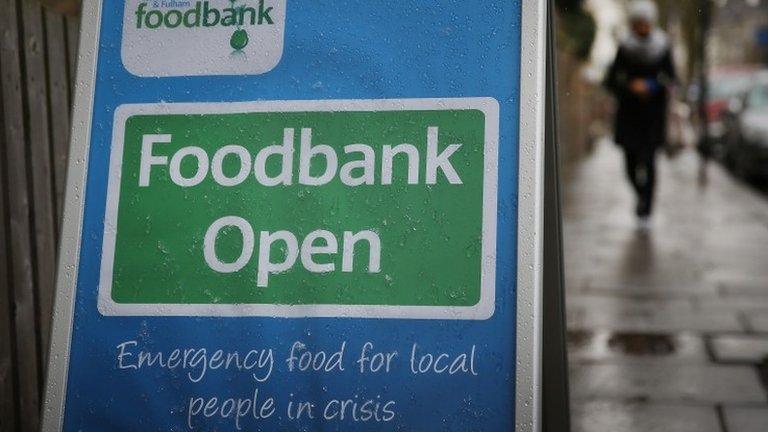Food banks see 'shocking' rise in number of users
- Published
- comments
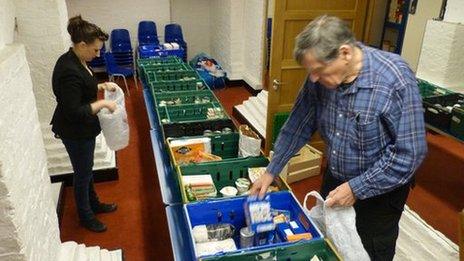
Benefit sanctions are one reason for increased use of food banks, it is claimed
A food bank charity says it has handed out 913,000 food parcels in the last year, up from 347,000 the year before.
The Trussell Trust said a third were given to repeat visitors but that there was a "shocking" 51% rise in clients to established food banks. It said benefit payment delays were the main cause.
In a letter to ministers, more than 500 clergy say the increase is "terrible".
The government said there was no evidence of a link between welfare reforms and the use of food banks.
However, the Trussell Trust, the largest food bank provider in the UK, said benefits payments had been a particular problem since welfare changes were introduced just over a year ago.
Some 83% of food banks reported that benefits sanctions - when payments are temporarily stopped - had resulted in more people being referred for emergency food.
And more than 30% of visits were put down to a delay in welfare payments.
The second biggest reason, given by 20% of food bank users, was low income.
"In the last year, we've seen things get worse, rather than better, for many people on low incomes," said Chris Mould, chairman of the Trussell Trust.
'Terrible'
In all, 913,000 people received three days of emergency food supplies in the past 12 months.
But more than a third of those cases represented repeat visits. Some of the increase was also down to extra food banks opening.
Andy, a 47 year-old unemployed electrician, applied for jobseeker's allowance (JSA) a week ago, but has not heard when the money will come through.
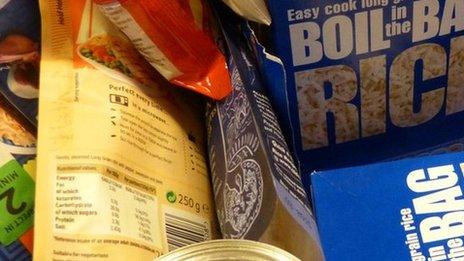
In the meantime, he has been referred to a food bank near his home in Hackney in north London.
"If I didn't come here, there wouldn't be any food for me tonight. It's the system. But I don't understand why there's a gap," he told the BBC.
Andy was sent away with two shopping bags of pasta, rice, vegetables, biscuits and juice.
The clergy from all major dominations, who include Archbishop of Wales Barry Morgan and several senior Church of England bishops, describe the increase in the use of Trussell Trust food banks as "terrible", in a letter to the government.
Sarah Rae: "I didn't think I would ever be the sort of person who would need charity"
They insist it does not give a full picture of hunger in the UK because it does not include people who are too ashamed to use food banks and others who are cutting the size of meals.
They called on ministers to co-operate with an inquiry into the causes of hunger, led by the Bishop of Truro Tim Thornton.
A public vigil will be held on Wednesday night in Westminster to highlight the issue.
Paperwork
The government denies that welfare payments are a problem.
"There is no robust evidence that welfare reforms or benefit administration are linked to increased use of food banks," said a spokeswoman for the Department for Work and Pensions (DWP).
She also maintained that the amount of time taken to process payments had improved.
Some 92% of payments were now made within the target time of 16 days, a 6% improvement on the time taken five years ago, she told the BBC.
But an additional problem since April 2013 has been the abolition of DWP-funded crisis loans, designed to cover short-term emergencies.
Responsibility for these loans has been devolved to local authorities, which can make them harder to access.
Short-term advances, as they are known, are still available through job centres for people awaiting benefit payments. But many claimants - including Andy - are not always made aware of them.
Other people have their payments stopped, sometimes because they have missed an appointment, or have lost paperwork.
"We're often surprised by the length of sanctions people get," said Liza Cucco, the manager of the Hackney food bank.
"If someone is late for an appointment, I'm not sure it's reasonable to block their payments for four to six weeks," she told the BBC.
However the government said it was spending £94bn a year on working age benefits to provide a safety net to millions of people on low incomes.
It also insisted that its welfare reforms will promote work, and so lift millions of people out of poverty.
- Published6 April 2014
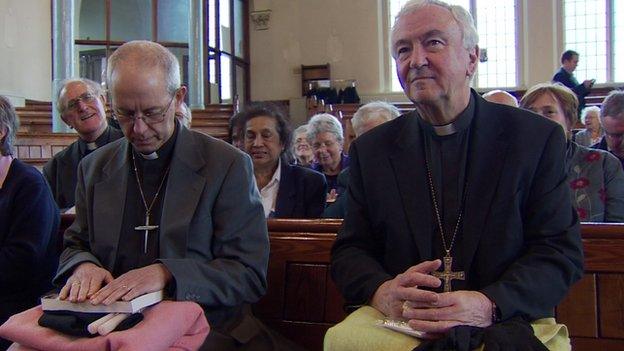
- Published3 March 2014
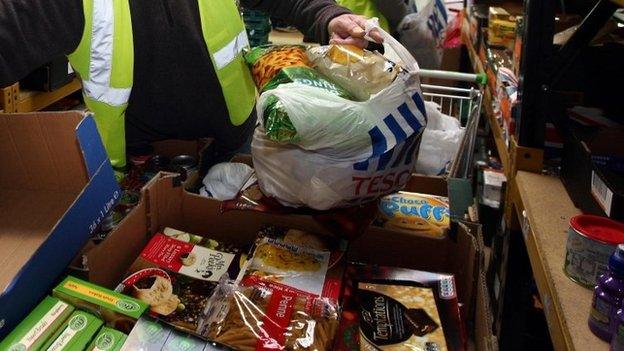
- Published20 February 2014
